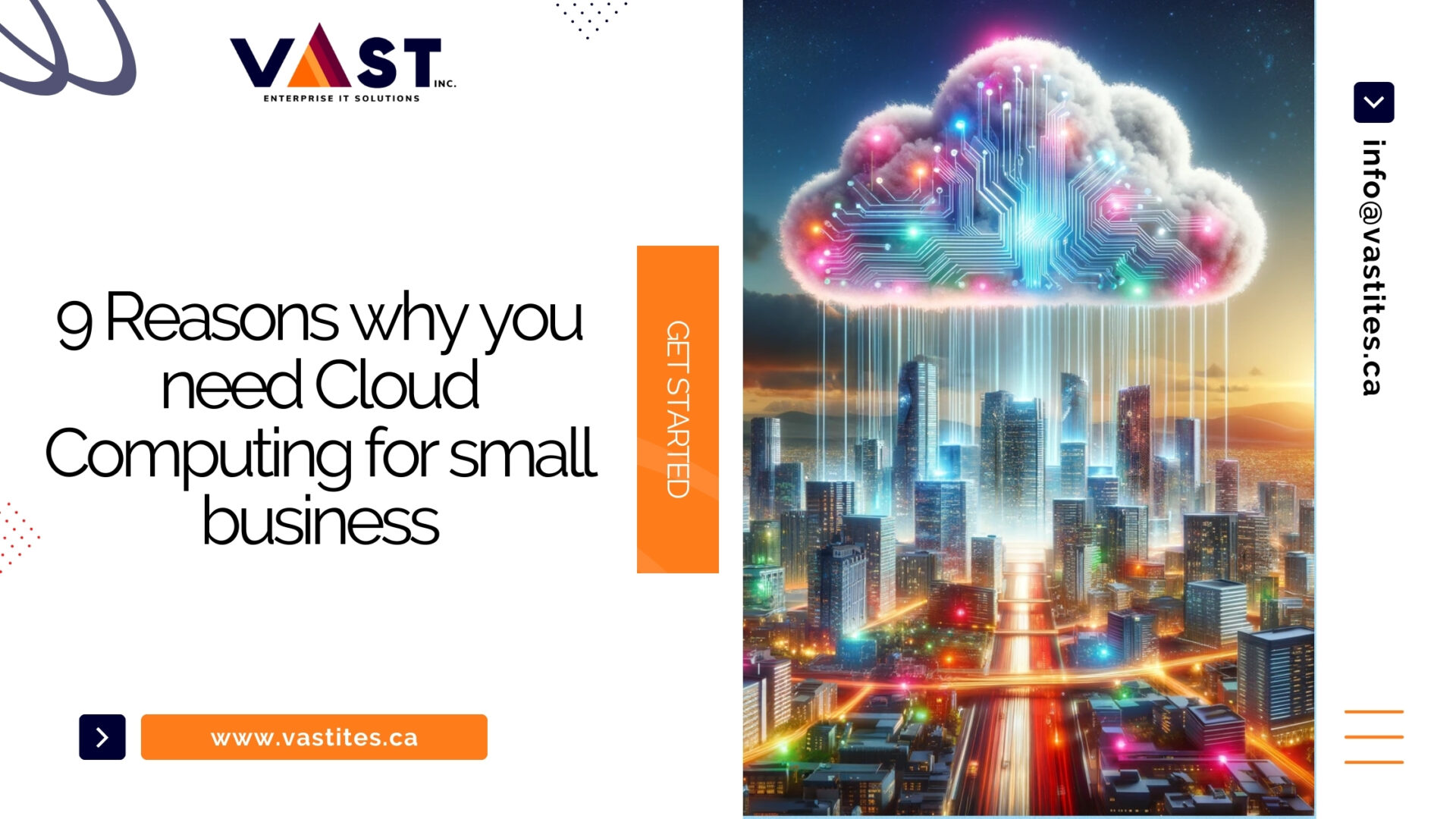
In the ever-evolving landscape of innovation, cloud computing has arisen as an extraordinary power. Particularly for small businesses looking for productive and financially savvy arrangements. Understanding the principals of cloud computing design and its different applications can make you take right decision. In this blog, we dive into the meaning of cloud computing, its design, types, and in particular, five reasons why you need cloud computing for small businesses.
What is cloud computing?
Cloud computing is a type of hosted service for data storage, networking, databases, and software over the internet. This data is stored in physical servers and is maintained by cloud service providers. These computer system resources are available on demand and do not need maintenance by the user.
Cloud computing architecture
Rather than putting away documents on a storage device or hard drive, a client can save them on the cloud. It will make it possible to get to the records from any place, as long as they access the web. Infrastructure-as-a-service (IaaS), platform-as-a-service (PaaS), and software-as-a-service (SaaS) are the three main types of cloud-hosted services. In light of the deployment model, the cloud can likewise be classified as a public, private, and hybrid cloud.
Further, the cloud can be separated into two distinct layers, in particular, front-end and back-end. The layer with which clients cooperate is known as the front-end layer. This layer empowers a client to get to the information that has been put away in the cloud through cloud computing.
The layer comprised of software and hardware, i.e., the PCs, servers, central servers, and information bases, is the back-end layer. This layer is the essential part of the cloud and is very much answerable for putting away data safely. To guarantee a consistent network between devices connected through cloud computing, the central servers utilise a product called middlewareOpens. It is another window that goes about as an extension between the database and applications.
Cloud computing uses
Many cloud computing uses can offer significant business benefits to organizations. Cloud computing is a computing model and set of innovations that permit customers to get to cloud services on a pay-as-you-go model.
Cloud computing is becoming increasingly popular by the day. Even though it is a relatively new paradigm that has only recently gained widespread acceptance.
From government offices and NGOs to non-profit organizations and small businesses, the different purposes of cloud computing have demonstrated viability in giving a variety of answers for different issues.
All things considered, have you adopted cloud computing for business? If you haven’t, it’s because you don’t understand the cloud computing uses and the advantages for your business.
Uses for small business
File storage
- There are many options for how to store and access your data. There’s the hard drive on your PC, the external hard drive, migrating data, network files, USB drives.
- With so many storage choices accessible, what makes cloud storage exceptional? Indeed, the reason for why cloud storage is appealing is that files are available and can be edited effortlessly. You need the Internet and you can get to your documents from any gadget, place. There are different types of cloud storage like block, file, and item object storage. These each fit different use cases from shared filesystems to block-based volumes and backup and archiving frameworks.
- With cloud computing storage services like Amazon S3, DropBox, or OneDrive. You will be given secure access and the adaptability to alter storage based on your necessities and financial plan. Consequently, this sort of capacity isn’t just secure yet in addition very reasonable.
Big data analytics
- If your company does not collect big data now. It will be severely behind. This could be data about your customers, market trends, sales performance, and more.
- Organizations of all sizes need big data for many of reasons. Some gather it to find new open doors for business development, while others do as such to track down answers for complex issues.Gathering and breaking down big data, be that as it may, doesn’t come simple. It requests the utilization of immense computing assets, which accompany a heavy price tag.If you somehow managed to buy the resources required for cloud computing, then, at that point, you might need to slash budget plans meant for other fundamental services like marketing. This is the kind of thing you don’t need to do assuming you adopt cloud computingThe essential advantage of cloud computing is that it provides a pay-as-you-go model. This implies that you won’t need to pay for unused time – saving your business a lot of cash. You possibly access assets and pay for them when you want them.
- Indeed, cloud computing makes big data examination straightforward, helpful and reasonable. For more data, Amazon Web Services (AWS) offers a few analytical services for different use cases.
Read more: What is the role of AWS in DevOps
9 reasons why you need cloud computing for small business

Flexibility
Cloud computing assists small businesses with keeping a flexible way to deal with work. You can work from anywhere and at any time with it. You can keep up with your business on the cloud and give your employees and contractors access to important data anytime and anywhere. For instance, you might have your business in New York, however, you choose to travel to Europe to sign a contract. You can take care of data on the cloud permitting your employees to keep up to date with the ongoings, and assisting the business with updates., even in your absence.
For example, brings inventory services, retail location, order tracking, and e-commerce business into one single application. Other free and minimal expense models incorporate cloud-based group communication and collaboration tools like Slack or the GSuite. With these, your group has the adaptability to sign in and cooperate from pretty much any place, on desktop or mobile.
Productivity
Cloud computing isn’t just a life hack yet it eliminates hindrances to correspondence and permits you to monitor the utilisation of your data. It permits cooperation and straightforwardness in a business – two terms that ought not to be underestimated. One more extraordinary benefit of cloud computing is that it gives you an edge over your rivals. It gives you exposure to cutting-edge innovation and permits you to keep steady over your game. It likewise permits you to keep in contact with your clients by taking advantage of the Customer Relationship Management (CRM) software.
Cost efficiency:
Cloud computing is a lot less expensive than conventional methods for data storage. A small business should save each penny it can for survival. Cloud computing permits a business to store huge amounts of data at a generally cheap cost. In addition? Data space on the cloud is close to limitless; in this way, you don’t need to be worried of storage running out.
Less load on IT Department
Apart from the worst-case scenario, moving to the cloud can ease the burden for your IT division, especially if you take advantage if best cloud consulting in Toronto to assist with everyday tasks like network monitoring and support. In a private company, it’s generally a battle to extinguish every fire — you’re in a reactive mode, responding to issues as they emerge.The issue with a responsive approach to manage your framework is that it doesn’t leave space for innovation. You’re not thinking ahead because you’re investing such a lot of energy sorting out some way to manage what has previously occurred.
Moving into a proactive mentality is basic if you desire to deliver innovation to your business. By taking advantage of cloud-based monitoring and IT solutions, you can free up your tech team to concentrate on what comes next and offload the reactive work.
Less Maintenance
Remember the thing I said about the security part of cloud computing? Indeed, a piece of that security requires standard support of servers, software updates, and network management. Fortunately, cloud computing takes all of that support off your plate and leaves it in the possession of prepared experts.
You don’t need to stress over purchasing modern hardware every three to four years since none of it is facilitated by you. You don’t need to manage any of that support, which saves extra time for your organization to focus on the product or services.
This is the peace of mind you really want, particularly if your organization is simply off the ground and you don’t have the labor to manage broad equipment updates.
Protection of data and information
Data theft is real and Data stealing and abuse are high. If you’re actually utilizing conventional storage systems, the probability of your data getting into some wrong hands is very high. On the cloud, in any case, your information is secured and can’t be gotten to except if you permit it to be accessed. You can manage the data you share. You can choose to keep the most sensitive information to yourself or only let people you trust access to it. Putting away your significant information in the cloud additionally safeguards you from devastating data loss. Unlike hazardous physical mediums which can be cleared out by a PC or server crash string your data on the cloud dispenses with this risk and you can access to your information even after an extremely significant stretch of time.
52% of entrepreneurs say that it would require no less than 90 days to recover from a disaster. This is all the truth that 40% of small businesses never return after a disaster closes them down.
Moving your important data and business cycles to the cloud gives you the redundancies you really want to ensure that you don’t lose key data or usefulness when everything goes south.
Better collaboration and transparency
Do you remember the old times of sharing versions of files over email and not realizing what was being changed and when? Since only the immediate user could view and edit those documents, those procedures often resulted in work being duplicated.
That is all in the past because of cloud computing. Cloud computing further improves collaboration between teams and transparency of work. Regardless if you use sales strategy or lead generation, cloud computing will enable you to share this this data with everybody in your groups progressively.
The perfect example of this is the Microsoft Teams I’m composing this article on. I compose the substance here. My proofreader can then go into this cloud document and make any improvements they believe are essential. Then, at that point, pass along this equivalent connect to the publishing group to enter the substance into our content framework. I can return to the document while this is going on to see how the edits are progressing and answer questions in real-time. Why? Cloud computing! This document lives on the web and anybody with access can get to it. This is a lot simpler than the older times of rearranging Word records over email.
Improved performance
Local edge computing, better collaboration, free availability, and fast computing are the backbones of cloud computing services. Cloud innovation can empower small businesses to carry automation and lessen latency to work on overall performance. Likewise, regular updates in the security and execution of data centres additionally empower organizations to keep their information in a more secure condition and more coordinated way. With the scope of advantages in efficiency, collaboration, and security, small businesses can have the upper hand through cloud computing services. Top players like Microsoft Azure services and Amazon give first-class cloud services to address the issues of present-day organizations productively. You can take advantage of cloud technology by consulting a reputable cloud solutions provider if you are the owner of a small business or a startup.
Environment
If your company intends to remain on this planet for a significant amount of time, it is critical that you keep up with the global trend toward environmental sustainability. Physical computing frameworks create a ton of destructive results. The cloud isn’t physical and doesn’t emit unsafe gas into the air. Being on the cloud will, at the very least, give you peace of mind that you have protected the environment in your own “little” way.
Conclusion
To conclude, the reception of cloud computing is no longer a luxury but an essential need for small businesses. The heap benefits, from adaptability and efficiency upgrades to cost proficiency and further developed information security, highlight the significant job that cloud innovation plays in reshaping present-day business tasks. As a DevOps engineer, perceiving the meaning of cloud computing applications can engage you to enhance foundation, smooth out processes, and guarantee your business stays coordinated and serious in a consistently developing automated scene. Embrace the cloud – as a mechanical arrangement, yet as a key empowering influence of development and strength for your small business.
